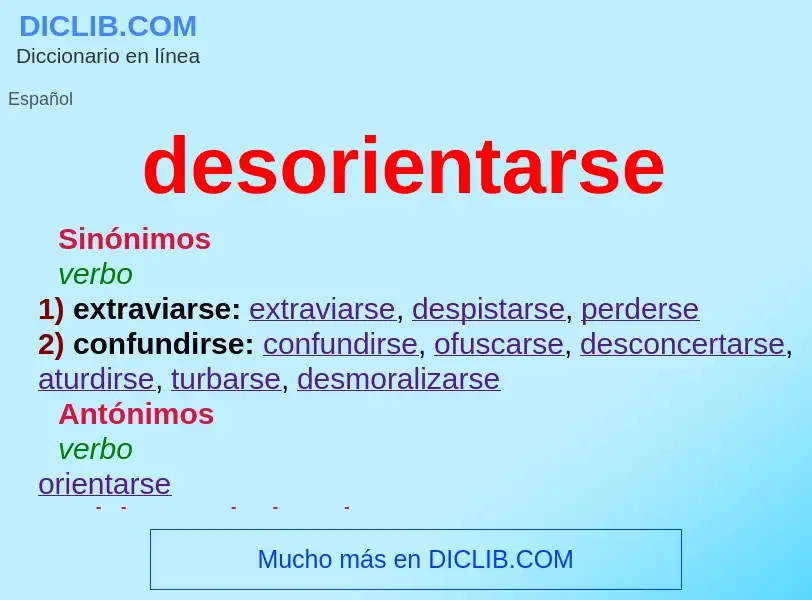Enter a word or phrase in any language 👆
Language:
Translation and analysis of words by artificial intelligence
On this page you can get a detailed analysis of a word or phrase, produced by the best artificial intelligence technology to date:
- how the word is used
- frequency of use
- it is used more often in oral or written speech
- word translation options
- usage examples (several phrases with translation)
- etymology
What (who) is desorientarse - definition
desorientarse
Sinónimos
verbo
Antónimos
verbo
Palabras Relacionadas
orientado
orientado, -a Participio adjetivo de "orientar". ("Estar") Se usa muy frecuentemente con "bien" o "mal", aplicado tanto a personas como a cosas: "Ese muchacho está bien orientado y hará carrera. Un negocio mal orientado". Sin ningún adverbio, se entiende "bien orientado": "Se ve que va orientado".
orientar
orientar (de "oriente")
1 ("a, hacia") tr. y prnl. Poner[se] una cosa en cierta dirección: "Orientar el timón hacia el sur [o hacia la costa]. Orientar la barca hacia el islote. Orientar la fachada de la casa al mediodía. La veleta se orienta en dirección norte-sur". *Dirigir[se] una acción a determinado objetivo o por determinado camino: "Él orientaba sus investigaciones en un sentido equivocado". prnl. El sujeto puede ser también la persona que realiza esa acción: "El muchacho se orienta hacia la ingeniería". tr. Mar. Colocar las velas en forma conveniente para que reciban el viento.
2 Mostrar a alguien el camino que le conviene seguir: "Los letreros del metro orientan al viajero". *Dirigir, *guiar. También en sentido figurado: "El profesor orienta a los alumnos en sus trabajos. Sus informes me orientan respecto a cómo está el asunto". ("por") prnl. Adquirir el conocimiento de dónde se está o del camino que se debe tomar guiándose por algo: "De noche nos orientamos por las estrellas". Dirigir alguien su conducta basándose en ciertos datos o noticias. *Regirse. Tomar un camino seguro en lo que se hace: "Parece que el nuevo director se va orientando". *Encaminarse, encauzarse. *Brújula. Faro, guía, norte. *Encaminar[se], encauzar[se], saber dónde tiene la mano derecha [o lo que lleva entre manos]. Sentido de orientación. Desorientar.
3 tr. Determinar la posición de una cosa respecto de los puntos cardinales.
4 Indicar en un *mapa la dirección norte, por ejemplo por medio de una flecha.
Examples of use of desorientarse
1. El mejor lugar de Madrid (y el más alto) para desorientarse, confundir el sur con el norte y escapar de la silueta vertical de las cuatro torres de La Castellana está en el interior de una de ellas.

